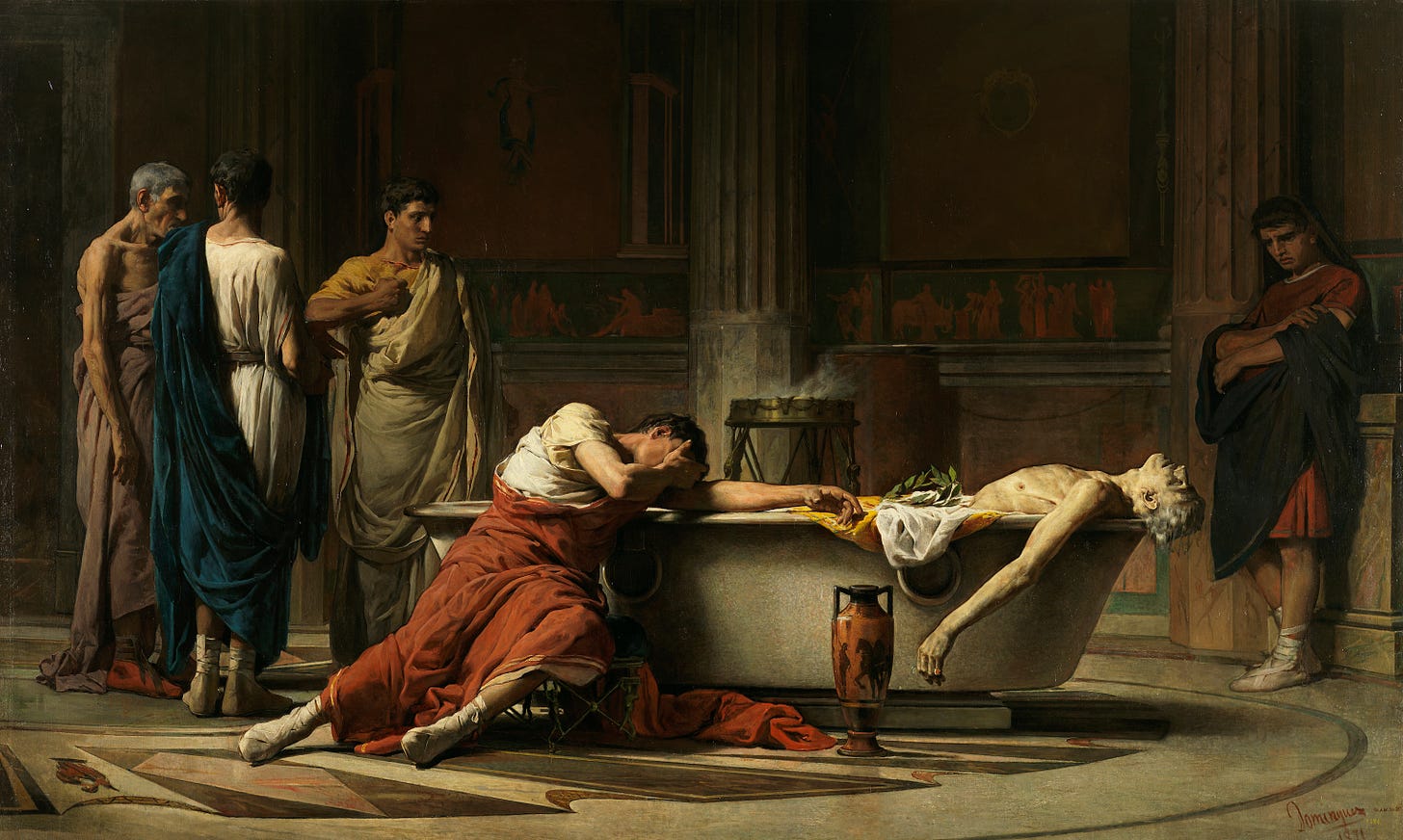Against Euthanasia: A Stoic Reflection on the Expanding Culture of Exit
There is an old Stoic phrase: The door is always open. It meant that if life became truly impossible to live in accordance with virtue — if one’s capacity for reason had genuinely collapsed — then death, approached with clear judgement, could be an honourable end. But this principle was never meant as a convenience, nor as a solution to discomfort. It was not an escape from hardship. It was a final act of reason, chosen rarely, with gravity.
This distinction is worth remembering as more and more countries in the Western world move to expand euthanasia laws. Framed as compassion, autonomy, and mercy, the legalisation of assisted death increasingly presents itself as the rational response to suffering. And yet from a Stoic perspective, this shift risks enshrining an error: the idea that life ceases to be meaningful when it ceases to be comfortable, autonomous, or under control.
Stoicism has never denied the weight of pain. But it draws a hard line between suffering and moral evil. Pain, grief, and decline are what the Stoics called “indifferents” — not desirable, but not themselves grounds for despair. The true threat is not physical deterioration. It is the corrosion of the soul: cowardice, resentment, the loss of integrity, the abandonment of rational agency.
Cato did not take his life because of illness or discomfort. He did so when tyranny made it impossible to act freely according to virtue. Seneca endured years of political humiliation under Nero, striving to maintain some measure of integrity within a corrupt court. His death, when it came, was not freely chosen but ordered by the emperor — a sentence masked as permission. Yet even then, Seneca treated his final moments as a chance to embody the Stoic discipline he had long written about. He could not choose the hour, but he could still choose how to meet it.
This is not to romanticise suffering. There is no Stoic mandate to endure every indignity, nor to hold onto life under all conditions. But the danger of formalised euthanasia regimes lies precisely in their quiet message: that the loss of ease or independence marks the end of a life worth living. That to suffer is to lose one’s place in the moral world. That control — over the body, over outcomes, over comfort — is a prerequisite for dignity.
This is not Stoicism. It is fear, dressed in the language of care.
What a Stoic fears most is not physical pain, but moral collapse. The question is not “Do I suffer?” but “Do I still act according to reason and virtue?” The moment when life no longer offers ethical possibility — when one cannot choose justly, cannot reason freely, cannot love, serve, or endure with dignity — that moment may, in some rare and tragic cases, justify the door being opened. But these are not common moments. They are not definable by checklists or codified suffering thresholds.
A legal framework may be able to detect discomfort. It may even be able to define unbearable pain. But it cannot meaningfully determine whether a life has truly lost its moral potential. That is a question of the soul, not the state. To try and formalise it is to confuse the technical with the existential.
It is understandable that modern societies wish to relieve pain and honour individual agency. But agency itself is misunderstood if it is reduced to the ability to opt out. A will that cannot suffer, that cannot bend, that cannot stay through uncertainty — is not agency. It is preference, misunderstood as freedom.
This is why Stoicism is cautious. It knows that in a culture of speed, comfort, and spectacle, even suffering becomes something to be managed, cleaned up, outsourced, or erased. But some experiences — especially those near death — resist simplification. They ask of us not convenience, but character.
The Stoic path does not demand martyrdom. But it does ask whether we are abandoning life because it is truly unliveable in accordance with virtue — or simply because we have forgotten how to value life when comfort, independence, or visible purpose are no longer guaranteed.
As euthanasia laws expand — in Canada, in the Netherlands, in Belgium, and in legislative proposals elsewhere — the concern is not only legal, but cultural. A right, once institutionalised, quickly becomes a norm. And norms shape expectations. They shape how we look at suffering, at ageing, at disability, and at one another. They shape what we silently decide makes a life worth keeping.
To ease pain is noble. But to confuse pain with the absence of meaning is not. When the presence of suffering becomes a justification for exit, we risk teaching ourselves that fragility discredits life. That dependence is undignified. That limits mark failure.
A Stoic would urge us to be careful what we normalise. Not because all who choose death are wrong, but because when death becomes streamlined, sanitised, and procedural, it risks becoming a replacement for what is harder to sustain: patience, solidarity, endurance, and the quiet dignity of continuing on.
There are many forms of courage. One of them is to live well, even when living is no longer easy. And another is to protect, quietly and without drama, the idea that life remains meaningful — even when it is diminished, dependent, or filled with difficulty. That meaning is not a mood, or a convenience, or a personal preference. It is something we discover, sometimes painfully, by remaining.
Miklós Cseszneky


